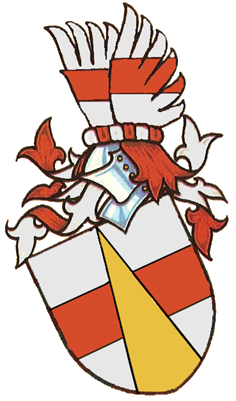Rachet d'Everard (crusader): Difference between revisions
Tag: 2017 source edit |
Writing fake history instead of my actual history Tag: 2017 source edit |
||
| Line 21: | Line 21: | ||
Not much is known of d'Everard's early life. He was first mentioned in a writ from 1462 as a lieutenant of de Martigueux's crusader army. He took part in the [[Conquest of Joanusterra|crusader invasion of Gothica]] on the side of the crusaders and is noted in a manual from the late fifteenth century as a skilled commander and fighter in his own right. d'Everard was made a [[Knights of the Oblong Table|Knight of the Oblong Table]] in 1467 by [[Joanus de Martigueux]] in recognition of his service and a [[Barons of Yonderre|Baron]] in 1470, creating the [[House d'Everard]]. He is noted for his motto ''Du doch nicht!'' which translates from [[East Gothic language|Gothic]] as "Definitely not you!". The motto refers to an incident during the [[Conquest of Joanusterra]] wherein d'Everard at the head of a small force was offered to surrender to a numerically superior Gothic army. When asked how he thought he could possibly win the battle by a Gothic commander, d'Everard responded laconically with ''Du doch nicht!''. | Not much is known of d'Everard's early life. He was first mentioned in a writ from 1462 as a lieutenant of de Martigueux's crusader army. He took part in the [[Conquest of Joanusterra|crusader invasion of Gothica]] on the side of the crusaders and is noted in a manual from the late fifteenth century as a skilled commander and fighter in his own right. d'Everard was made a [[Knights of the Oblong Table|Knight of the Oblong Table]] in 1467 by [[Joanus de Martigueux]] in recognition of his service and a [[Barons of Yonderre|Baron]] in 1470, creating the [[House d'Everard]]. He is noted for his motto ''Du doch nicht!'' which translates from [[East Gothic language|Gothic]] as "Definitely not you!". The motto refers to an incident during the [[Conquest of Joanusterra]] wherein d'Everard at the head of a small force was offered to surrender to a numerically superior Gothic army. When asked how he thought he could possibly win the battle by a Gothic commander, d'Everard responded laconically with ''Du doch nicht!''. | ||
In his 1953 work ''Gothic Crusaders of the War of Errantry'', Yonderian historian [[Ewald Hohenkreuz]] contended that, had the lowborn d'Everard been born a nobleman, he would have likely been made [[Stewards of Yonderre|Steward]] of one of the future [[Counties of Yonderre]], using the example of [[Eberhard the Sentinel]] as his primary line of evidence. This claim has since been a topic of some debate in Yonderian history circles, causing questions regarding the general interface of nobility and lowborn peoples in the nascent marcher realm Joanusterra. | |||
Rachet d'Everard died in 1498 and his estates were divided between his sons Phillipe and Falco. d'Everard also had three daughters who survived to adulthood, although their names are unknown. | Rachet d'Everard died in 1498 and his estates were divided between his sons Phillipe and Falco. d'Everard also had three daughters who survived to adulthood, although their names are unknown. | ||
Revision as of 15:28, 29 December 2024
Rachet d'Everard | |
|---|---|
 Coat of arms granted to Rachet d'Everard by Joanus de Martigueux in 1470 | |
| Born | Radzig Eberhard 1433 |
| Died | February 22, 1498 (aged 64–65) |
| Occupation | Marshal |
Rachet d'Everard (born Radzig Eberhard, 1433 – February 22, 1498) was a Gothic-born Yonderian crusader, Knight of the Oblong Table, marshal and nobleman who served the Crusader Count Joanus de Martigueux during and in the years after the Conquest of Joanusterra.
Not much is known of d'Everard's early life. He was first mentioned in a writ from 1462 as a lieutenant of de Martigueux's crusader army. He took part in the crusader invasion of Gothica on the side of the crusaders and is noted in a manual from the late fifteenth century as a skilled commander and fighter in his own right. d'Everard was made a Knight of the Oblong Table in 1467 by Joanus de Martigueux in recognition of his service and a Baron in 1470, creating the House d'Everard. He is noted for his motto Du doch nicht! which translates from Gothic as "Definitely not you!". The motto refers to an incident during the Conquest of Joanusterra wherein d'Everard at the head of a small force was offered to surrender to a numerically superior Gothic army. When asked how he thought he could possibly win the battle by a Gothic commander, d'Everard responded laconically with Du doch nicht!.
In his 1953 work Gothic Crusaders of the War of Errantry, Yonderian historian Ewald Hohenkreuz contended that, had the lowborn d'Everard been born a nobleman, he would have likely been made Steward of one of the future Counties of Yonderre, using the example of Eberhard the Sentinel as his primary line of evidence. This claim has since been a topic of some debate in Yonderian history circles, causing questions regarding the general interface of nobility and lowborn peoples in the nascent marcher realm Joanusterra.
Rachet d'Everard died in 1498 and his estates were divided between his sons Phillipe and Falco. d'Everard also had three daughters who survived to adulthood, although their names are unknown.